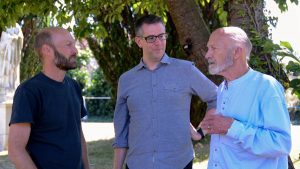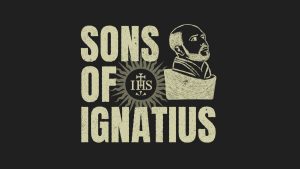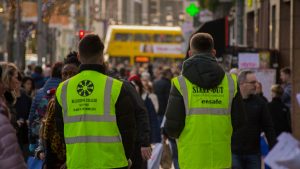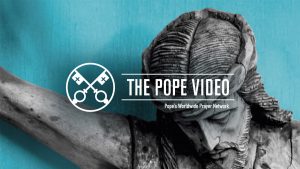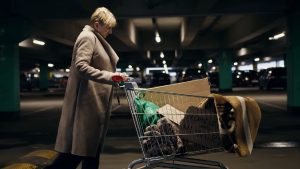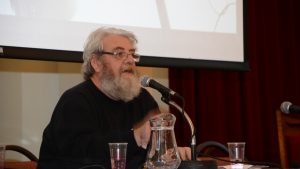Trafficking and the Irish sex industry
by Cathy Molloy
Below are excerpts from Cathy Molloy’s lengthy study of trafficking and the Irish sex industry in Working Notes, a quarterly publication of the Jesuit Centre of Faith and Justice, Gardiner Street, Dublin. The whole report can be accessed here.
"These stories are horrific. They made us really angry that this could be happening in our country…We are not going to stop until the legislation is changed." (The Carlow Nationalist, 19 May 2005, quoting Catriona Kelly, then a Transition Year student at St. Leo’s College.)
At the Young Social Innovator of the Year Awards 2005, the Transition Year class of St Leo’s – founded by the Sisters of Mercy in 1839 – won the Global Citizenship Award. Their project, ‘Stop the Trafficking of Women into Ireland for Sexual Exploitation’, was inspired by stories of young girls and women whose experiences were so shocking that they could not be ignored.
 The discovery of the body of a 25-year old Malawian woman near Piltown, Co Kilkenny, and the story of an 11-year old non-national trafficked into Ireland and raped and abused, spurred the students into action to raise awareness of the issue of trafficking and to work for a change in the laws that will reduce the possibility of such events being repeated.
The discovery of the body of a 25-year old Malawian woman near Piltown, Co Kilkenny, and the story of an 11-year old non-national trafficked into Ireland and raped and abused, spurred the students into action to raise awareness of the issue of trafficking and to work for a change in the laws that will reduce the possibility of such events being repeated.
Move on to 8 May 2006 and a Prime Time Investigates programme on the trafficking of women and girls prompted many people to engage with the issue. At the Dail Adjournment Debate on the Sexual Trafficking of Women on 10 May 2006, Ciaran Cuffe TD (Green Party) put it to Michael McDowell TD, Minister for Justice, Equality and Law Reform, that, although a 2002 EU Council Framework Decision obliged all EU Member States to introduce legislation to criminalise human trafficking by 2004 at the latest, Ireland remained the only Member State that had yet to do so. He also asked for sensitivity and compassion in the treatment of victims who have suffered terribly at the hands of traffickers, rather than arrest and imprisonment followed by deportation, as in the case of a Romanian woman whose traffickers were never brought to justice.
‘The idea that they are acting with relative impunity makes me sick to my stomach.’ So said Senator Mary White in reference to traffickers, on 29 June 2006 speaking at the Seanad Order of Business.
There must be an end to the ignorance that women who have been trafficked for sex are not being exploited in Ireland. The Prime Time Investigates programme highlighted the way women are being exploited in country towns and in cities throughout the country. There must be a concerted effort to highlight the fact that this is a modern day slave trade of vulnerable people, mostly women and children, for the sexual gratification of morally depraved individuals.
We, as legislators, must initiate a zero tolerance approach to those who are engaged in trafficking human beings for sex. The idea that they are acting with relative impunity makes me sick to my stomach. I want to see this issue accorded the priority it deserves and zero tolerance legislation introduced as quickly as possible.2
Trafficking is a virtually non-quantifiable aspect of the migration issue. By its nature it is secretive, exploitative, and thrives on a culture of oppression and fear in which human beings are literally treated as commodities to be moved, bought and sold, used or dumped at the whim of those whose aim is to profit at their expense. Trafficking in human beings includes also the moving of people – men and women and children – for cheap labour and is rightly called the ‘slavery’ of our time.
The issue of trafficking of women and girls into Ireland for sexual exploitation is becoming more widely acknowledged. A certain momentum is being built up among various State and non-governmental bodies who are including the issue in their research and publications. For example, the Irish Refugee Council Report 2006 includes a Draft Information note on human trafficking; in May 2006 the Department of Justice, Equality and Law Reform and an Garda Siochana Working group reported on Trafficking in Human beings; in Northern Ireland the PSNI reported on trafficking in January 2006; Ruhama, a Dublin-based NGO, working since 1980 with women involved in prostitution, published The Next Step Initiative, research report on barriers affecting women in prostitution in 2005; the print media and RTE have also been picking up on the issue.
(…)
 The issue of trafficking of women and girls into Ireland and within Ireland is gradually gaining importance in the public mind. Trafficking represents the most dramatic negative side of recent migration and the vigilance of many groups and individuals in society is needed if this gross injustice is to be curtailed and stopped. Some politicians are already playing a significant role in raising awareness but much more is needed from the many people who wittingly or unwittingly are part of the spectrum which runs from what is seen as ‘harmless entertainment’ to the serious exploitation and violation of women and girls, to even the death of some of them.
The issue of trafficking of women and girls into Ireland and within Ireland is gradually gaining importance in the public mind. Trafficking represents the most dramatic negative side of recent migration and the vigilance of many groups and individuals in society is needed if this gross injustice is to be curtailed and stopped. Some politicians are already playing a significant role in raising awareness but much more is needed from the many people who wittingly or unwittingly are part of the spectrum which runs from what is seen as ‘harmless entertainment’ to the serious exploitation and violation of women and girls, to even the death of some of them.
The proposed referendum on the rights of the child in Ireland has been almost universally welcomed. However, Ireland still remains the only country in the EU which has failed to pass a law criminalizing human trafficking – despite the EU Council Framework decision.
Legislation, however, is just a part of what will be needed to right the situations of injustice currently experienced in the sexual exploitation of people. The notion of ‘a just sexuality’, proposed here from the Zambian context has much to say to the current situation in Ireland. Our understanding of the cultural factors at play in the new Ireland would benefit from being accompanied by a more concerted effort at discussing some of the values we are absorbing as a society, whether consciously or by default, and whether these are compatible with the kind of understanding and experience of sexuality we would want for ourselves and our future generations.
Making the connections and links between our own situation and the radical injustice involved in the explicit exploitation of women and girls, whether local or from other countries, is a challenge for the whole society if we do want to retrieve control of sex, its meaning and representation, from the market, and to try to restore its full potential as a fundamental way of human relating.


